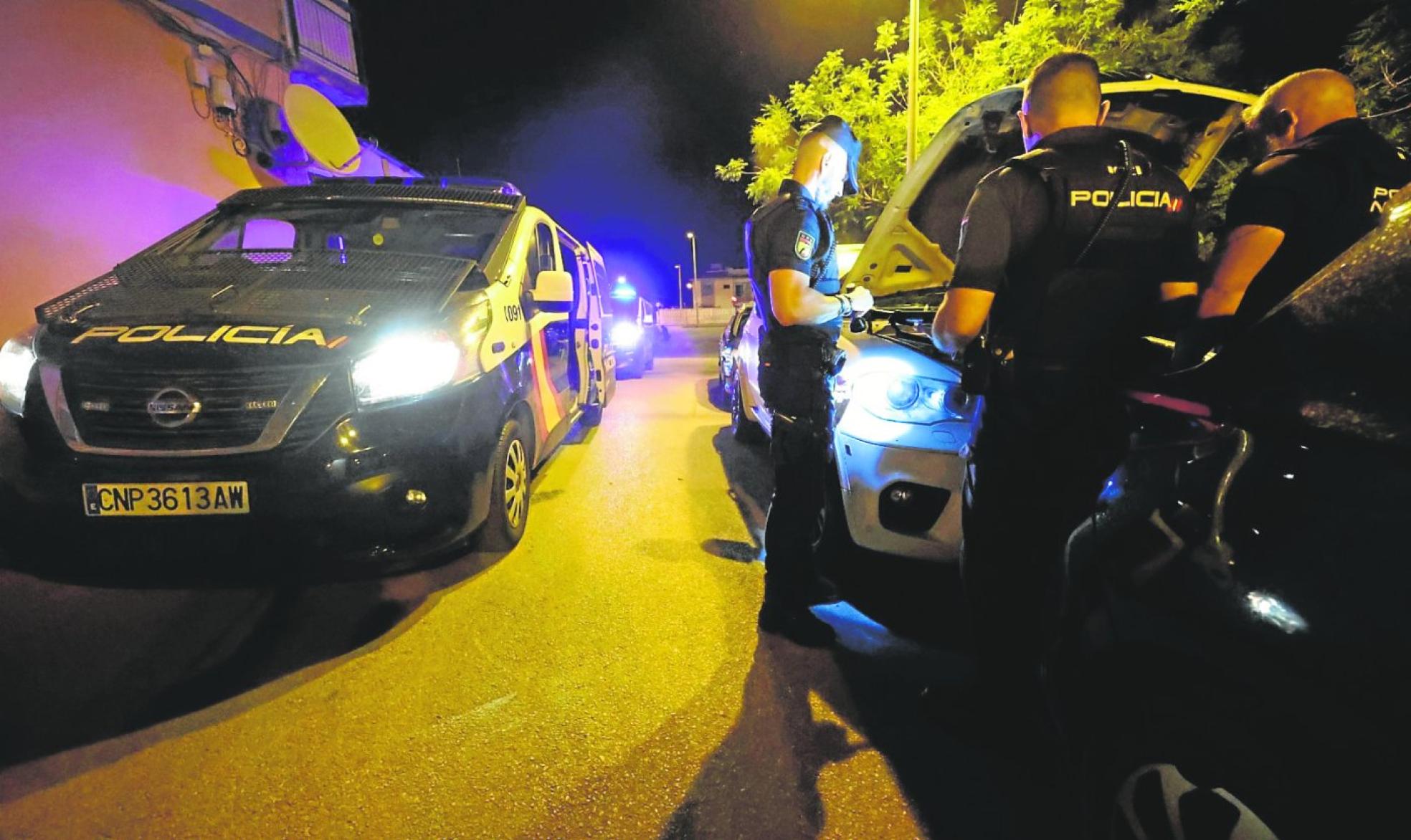
Fénix Tango: the Costa del Sol police who never sleep
Security. ·
SUR went along with officers from the Torremolinos Reaction and Prevention unit on a busy night shift which included checks for weapons and drugsSections
Highlight

Security. ·
SUR went along with officers from the Torremolinos Reaction and Prevention unit on a busy night shift which included checks for weapons and drugsIRENE QUIRANTE
Friday, 14 October 2022, 12:47
Compartir
The night begins. It's a Friday and the police vans are lined up outside the National Police base in Torremolinos. About 10.30pm officers from the Fénix Tango group head for their vehicles and set off with all their senses on full alert for possible offences being committed.
Ahead lie the most critical hours, in the early morning on a Costa del Sol that never sleeps. On this Friday night, SUR went with them. They don't stop until their shift ends and they hand over to their daytime colleagues as the sun starts to come up.
About 30 officers, divided into five teams, make up the police Prevention and Reaction Unit in Torremolinos, which also covers neighbouring Benalmádena. Their vans are always equipped with G-36 weapons, battering rams and protective shields. They never know what might occur on these nighttime patrols.
As they drive around the streets they listen to the messages coming in from the 091 call centre.
"When people are partying they tend to drink a lot and take drugs and that is when most of the arguments and fights take place," Miguel Ángel Medina tells us. He has been an officer with this squad for 12 years.
This is the common factor in most offences on the Costa del Sol, Medina says, regardless of their nature, and he knows this from long experience.
"When they steal a car or violently attack someone or drive off in a reckless manner because they have spotted the police, in the vast majority of cases drugs are involved," he says.
That is why these nightly patrols take place: as well as being able to respond immediately if something happens, the priority is also to stop them happening and it is in this preventive aspect that officers from this unit play such as essential role.
The patrols are organised so that anyone who has something to hide can't escape once they have been spotted.
"For the bad guys it's like getting trapped in a spider's web," Medina says. And when it comes to choosing where to place themselves and carry out their checks, intuition never fails the Fénix Tango team.
The police cars settle at the entrance to strategically selected roundabouts, roads or alleys at the times of night when problems are most likely to occur. The officers are also well aware that many smaller roads are used by drivers who are hoping to avoid Guardia Civil roadblocks and breathalyser tests.
"Good evening; are you carrying anything you shouldn't be?" the police ask the occupants of the vehicles. Then, always politely, they inform them that they are going to search them and the inside of the car.
Some confess immediately. "I've got a bit of grass," one young man says, handing over a small packet from his trouser pocket.
Others hope for the best and deny that they are carrying anything. "During these searches we have found all types of weapons and items used for criminal activity," Medina explains.
They have ranged from small penknives to large blades, revolvers and special equipment for making holes in a wall in order to carry out a robbery in an adjoining building.
Drugs, either those being sold individually or in the hands of trafficking groups, are discovered almost daily during these searches on the Costa del Sol.
"Drugs are very common. It can be anyone from a young man walking down the street with bags of cocaine or pills to sell to other people, to drivers whose cars have a hidden compartment containing hauls of drugs," Medina says.
Sometimes, however, their work is impeded by whistleblowers who use accounts on social media to warn people where the police patrols are situated.
"That information is very dangerous because, although people probably don't realise, they are helping criminals to escape. It could be someone who has just carried out a murder, or a driver who has hit a cyclist and not stopped, someone who has committed a violent robbery or cases of domestic abuse," Medina explains. "Those warnings mean that those people can avoid being caught."
Aware that word of their presence can be easily spread, the police constantly change the locations of these controls. After a few minutes in one place, searching cars and arresting anyone suspected of an offence, they move elsewhere.
These operations also help to find criminals who are on the run from other forces, the courts or international authorities. When they stop somebody it takes just a few minutes for them to check the databases to see whether the person in front of them is wanted for any offences, has court cases pending against them or if their record is clear.
And so, moving and checking, the night goes on in the same way for the Fénix Tango team, the officers who never drop their guard until it is time to go back to base at sunrise.
The officers closely inspect every single part of the cars they stop at night.
SALVADOR SALAS
An officer orders the driver of a car to stop at one of the police checkpoints.
S. SALAS
Members of the Fénix Tango team search a car during a night-time patrol.
S. SALAS
Reporta un error en esta noticia
Necesitas ser suscriptor para poder votar.